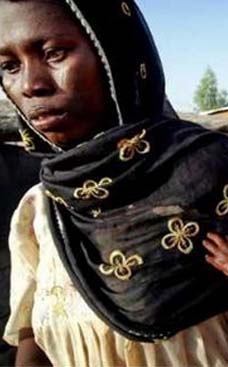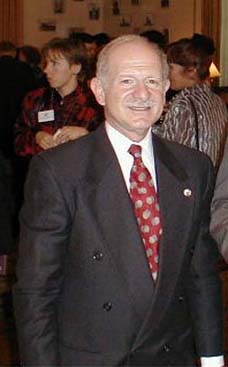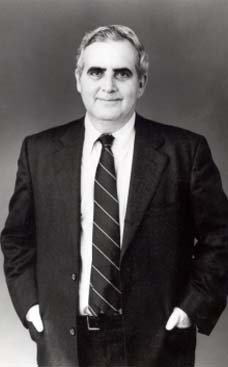July 11, 2005: Headlines: Figures: Country Directors - Togo: Country Directors - Niger: All Africa: C. Payne Lucas writes: "Can we win the war on HIV/Aids?"
Peace Corps Online:
Directory:
Togo:
February 9, 2005: Index: PCOL Exclusive: Staffer C Payne Lucas :
July 11, 2005: Headlines: Figures: Country Directors - Togo: Country Directors - Niger: All Africa: C. Payne Lucas writes: "Can we win the war on HIV/Aids?"
C. Payne Lucas writes: "Can we win the war on HIV/Aids?"
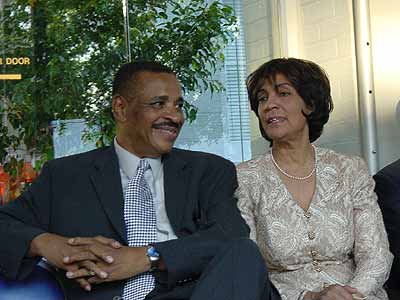
"I am sure the widespread and devastating consequences of HIV/Aids are not alien to you. I am guessing that many of you in this room have seen firsthand the effects of HIV/Aids on a patient, a family, a community, or a society. Some of you may have relatives, or old friends, who have been impacted in some way. Maybe your sister has adopted an Aids orphan, or your cousin is caring for a neighbor infected with HIV, or your friend's brother is infected; but, in some way, HIV/Aids has touched each and every one of us."
C. Payne Lucas writes: "Can we win the war on HIV/Aids?"
HIV/Aids in Nigeria: Can We Beat It?
allAfrica.com
July 11, 2005
Caption: Former Peace Corps Country Director and Africare founder C. Payne Lucas shares a moment with his wife Freddie Hill Lucas at his retirement reception from Africare in 2002. The article is the prepared text of an address he delivered on July 9, 2005 to the Association of Nigerian Physicians in the Americas Annual Convention in Nashville, Tennessee.
Perhaps you feel that as Nigerians, and as physicians, you are well aware of the HIV/Aids pandemic and do not need to be so constantly reminded. But as Nigerians and as physicians you do need to be reminded, because without your dedication - without the dedication of people who know and who understand the gravity and pervasiveness of HIV/Aids - we will not be able to overcome this tremendous burden. Then again, you are here today, eager to hear and eager to learn the latest research and efforts, and by being here today you have already demonstrated your interest, which is the first step in winning the war on HIV/Aids. As I am sure you know, the war against HIV/Aids is one that we cannot afford to lose. I am here to let you know that we must, and we can, curb the spread of HIV/Aids in Nigeria and throughout Africa.
I am sure the widespread and devastating consequences of HIV/Aids are not alien to you. I am guessing that many of you in this room have seen firsthand the effects of HIV/Aids on a patient, a family, a community, or a society. Some of you may have relatives, or old friends, who have been impacted in some way. Maybe your sister has adopted an Aids orphan, or your cousin is caring for a neighbor infected with HIV, or your friend's brother is infected; but, in some way, HIV/Aids has touched each and every one of us.
I include myself because the HIV/Aids crisis has affected me deeply. I have dedicated my life to improving life in Africa, first through the Peace Corps, and later through the NGO Africare, which I co-founded in the 1970s. For nearly 40 years I worked to improve access to healthcare and clean water, to empower communities and women, to ensure education, to preserve natural resources, to increase agricultural production, and to improve overall well-being throughout Africa. When I retired three years ago, I thought I had left a legacy of hope and positive change.
Yet, I found myself unable to ignore the downpour of dire information surfacing about the HIV/Aids pandemic. It seems that every day we hear more and more about HIV/Aids and its devastating impacts across globe; and rightly so, because this crisis demands our constant attention. At the end of 2004, almost 40 million people were estimated to be living with HIV, including almost 5 million people newly infected in 2004. More than 3 million people died of HIV/Aids in 2004 alone. As you heard from Dr Ekadi, these infections and deaths are having growing economic and social implications. The men, women and children infected with HIV/Aids were vital to their families - as husbands, wives, brothers, sisters, daughters and sons - but also vital to the community as doctors, teachers, farmers, miners, police officers, politicians, nurses, and soldiers. They have left in their wake a growing orphan crisis, teacher shortages, and a multitude of other devastating consequences, which, left unchecked, will certainly spell disaster.
Unfortunately, international health experts predict that this is only the beginning, and the worst is yet to come. Unless, of course, we raise awareness, we raise money, and we act - in an effective and lasting way. So I joined the crusade and dedicated the balance of my career to ensuring that we win the war against HIV/Aids and we do not let this virus undo the great strides that Africa has made in the past half century.
It was shortly after my initial 'retirement' when I first met Mr Yuichi Ishimaru, a Japanese executive, who like me, was working in his retirement to bring an end to the unnecessary suffering disease causes in Africa. Mr Ishimaru impressed me with his zeal, his dedication, his commitment, his eagerness, and most importantly, his keen awareness of the barrier that diseases such as HIV/Aids were having on economic development in Africa, and in turn, how poverty was perpetuating disease.
Like me, Mr Ishimaru was frustrated with the international response to HIV/Aids, partly because we did not seem to be doing enough, but also because our efforts were not having the overwhelming positive impact that we sought. So when Mr Ishimaru approached me about the Pan African Health Foundation, we call it PAHF, a not-profit-organization he founded to address Africa's disease burden AND its economic development with a permanent and capacity building programs, I was immediately interested and quickly joined his efforts. While PAHF's programs cannot bring an end to all of Africa's suffering and disease, they will bring measurable and lasting benefits, and can serve as a model of success for future initiatives.
You see HIV/Aids is a complex and multifaceted disaster. Medically, HIV/Aids is frustrating. Unlike many of your other patients, you cannot heal a patient with HIV/Aids. Indeed, we cannot hope to overcome Aids with one "magic-bullet." No, but what we can do, what we must do, is to work as an international community to tackle it from as many angles as possible. As efforts continue to develop a vaccine, we need education and prevention and treatment. We need to make anti-retroviral therapies more widely available. We also need efforts such as poverty reduction that will target the root causes of disease. And we must do all of this with a deep understanding of our scarce resources.
For me, this is what is so appealing about the PAHF concept that Mr Ishimaru developed: it simultaneously addresses many aspects of the HIV/Aids crisis and other healthcare concerns in Africa. PAHF is building factories in Africa - to be run on a not-for-profit basis - that will produce essential medical supplies to prevent and treat Africa's most deadly infections. And by supplies I mean not only the Auto-Disable syringes that PAHF will produce in our Port Harcourt factory, but also the jobs that are essential in breaking the poverty trap, and the technology and infrastructure needed for Africa to be able to maximize its existing natural resources and human potential. In short, I am talking about supplies for life.
You see PAHF's projects are designed on two principles. One, that Africa has the capacity to address its own challenges, and we must make use of this capability in order for our efforts to be successful. The second pillar of PAHF's design is that while Africa may need a little help from the international community in mobilizing its potential, our efforts must be geared toward ending this dependency by building self-sustaining solutions. We cannot continue the current system of donation dependency.
Let me explain to you how this will work. We are starting with an Auto-Disable (AD) syringe factory in Port Harcourt. For those of you who may not know, AD syringes use an automatic mechanical locking device to ensure that syringes can only be used once. Syringe reuse is such a tragic and unnecessary contributor to the spread of HIV/Aids, Hepatitis, and other blood infections. Did you know the World Health Organization estimates that almost half of all syringes are reused in the developing world? This reuse causes literally millions of infections of HIV and Hepatitis every year. Nobody should become infected while seeking medical services! Infections caused by syringe reuse are transmitting disease to in people trying to get well, or, even worse, to children getting routine immunizations. One child infected with HIV/Aids while being immunized is one too many.
There are many factors leading to syringe reuse and its spread of HIV, but a major factor is that AD syringes are just not available and affordable throughout Africa. That is why PAHF's factory will produce more than a 100 million of them, starting in 2007; But not just that year, but every year, for 10, 15, 20, or even 50 years. Even better, the factory is producing these life saving supplies on a not-for-profit basis. That means the syringes will be sold at a price that will cover the cost of their production and the continual operation of the factory, but will be below the price charged by profit-seeking manufacturers. We want to make sure everyone can afford these vital supplies.
But the benefits are even greater. This factory will train and employee local labor, creating jobs for the community and transferring technical and operational expertise. The factory will also creating lots of indirect jobs, by using local contractors for construction, taking advantage of existing local resources, and buying the bulk of its materials from local suppliers. And again, not just for one year but for 20 or 50 years: this project is truly an investment in the future. Once we prove the success of our model and our concept, we plan to replicate it for other vital medical supplies throughout Africa. Our plans include an Insecticide Treated Mosquito Net factory and a condom factory.
We are undertaking our first program - the AD Syringe Factory - in Port Harcourt, Nigeria. Nigeria is perfect place to show that we can we shift the aid paradigm for the temporary solution of donating supplies to the permanent solution of capacity building. Home to more than 130 million people, Nigeria is the most populous African country, and is standing on the brink of a major HIV/Aids crisis. While infection rates are still well below the most highly affected countries - Botswana, South Africa, and Zimbabwe - they are growing and at an estimated 5-10% of the adult population are reaching the critical mass for a major epidemic. This is why we must act now with strategic prevention efforts. You know the saying: an ounce of prevention with worth a ton of cure. Let us prevent this impending disaster.
Nigeria is the perfect place to show that it is possible to create programs that bring lasting prevention to the spread of HIV/Aids. Differences in political ideology aside, you must admit that President Olusegun Obasanjo has made great progress in improving Nigeria. He has shown himself a committed leader with his work in the OAU, NEPAD, the Commonwealth and others. He has shown himself to be committed to the people of Nigeria, and to health, economic, and social development throughout Africa. He is also committed to this project, and to the Pan African Health Foundation. Last November, when we broke ground on our Auto-Disable syringe factory, he was there, laying the cornerstone, and he has been one of our chief supports since the beginning.
Dr Peter Odili, Governor of the Rivers State, has also showed his deep commitment to the project, ear-marking significant state funding to this public-private partnership. Amidst many criticisms from the international community that Nigeria's bureaucracy is cumbersome and corrupt, we have found at least two leaders who have proved themselves to be vested in the interests of general well being. While there certainly is corruption in Nigeria (there is corruption in America too), and we you may say you wish the leaders were doing more - more to control corruption, more to manage diversity, more to benefit the people - that is certainly something we could say of leaders anywhere in the world, and we must take the time to recognize when good efforts are being made.
After all, we must get out of the blame game and take responsibility for what is going on around us. As individuals, as community leaders, as mentors, there is so much more we can do to help.
PAHF already has extensive international support. PAHF's founder, Mr Ishimaru, has been spreading PAHF's cause throughout Asia; our office in Washington is working to raise awareness and funds throughout the Americas; Our London Office is working diligently in Europe. Perhaps most importantly, our Nigerian offices are overseeing plant construction and working to build support among Nigerian people and institutions, as well as international companies working in Nigeria.
We are pleased to count among the contributors to this international public private partnership the Rivers State Government; the Nigerian Federal Ministry of Health; the many Oil Companies working in Nigeria; French, German, Japanese, American, and other companies working in Nigeria; the Nigerian Medical Association; and private citizens from many countries.
Yet, the Nigerian element to this project is the most important. A project like this can only be successful with massive participation and African ownership.
I came here today to remind you of what a dire situation Nigeria is facing because of the HIV/Aids crisis. But I also came to give you hope and to show you that there is something we can all do to help. Not just those of us in the room, but the world as a whole. New solutions like the Pan African Health Foundation's Auto-Disable syringe factory stand to make such a positive change. Each of the over 100 million syringes PAHF produces will ensure over 100 million safe injections, every year. That is up to a 100 million potential infections averted; so many lives saved or bettered.
But, indeed, the factory is so much more. It is a desperately needed economic catalyst; the transfer of essential technology, job creation, in short, it is hope. It is also the potential for so many more positive actions, as our model will be replicated to address other health concerns, such as Malaria. Help us prove our model is successful and leave a powerful legacy.
As I said before, you know the problems and the issues. You know the war against HIV/Aids is one that we cannot afford to loose. You know the struggles that many African countries continue to face in bringing adequate healthcare coverage to their population. And you have seen poverty. You also know however how much potential lies in Africa: in parents making sacrifices so that their children can go to school, in people ready, willing and able to work, if only good jobs were available… You know that we must realize this potential for the good of the continent, for the good of the hundreds of millions of people living in Africa.
In 40 years of development work, I have never come across a single project I felt was so poised to make such wide sweeping positive changes for Africans. PAHF's approach is a relatively radical approach when you consider it, yet, it seems so obvious and leaves you wondering why it was not been implemented sooner. Why do we continue to donate medical supplies to Africa when the materials out of which they are made are already in Africa? Let us put our money and our energy to better causes.
I urge you to join this effort. I hope you beg your friends to join too. You do not have to be a Physician or a Nigerian to support this worthy cause, you only have to believe in the people of Africa, and you have to care about winning the war against HIV/Aids. I believe this is the most important thing you can do. This small step against HIV/Aids is really no small step at all when you consider the enormous potential for positive change.
Some of you have already contributed, and I thank you sincerely for that. For the rest of you, I hope you will dig deeply into your hearts and think about what you can do. I promise you will leave no greater legacy than PAHF's factory, proudly producing AD syringes in Port Harcourt.
So that when I am asked, "Can we win the war on HIV/Aids?" I will be able to respond, "yes, we can beat it."
About the author

C. Payne Lucas was Peace Corps Country Director for Togo and for Niger in the 1960's. He co-founded Africare in the 1970's. He is now senior advisor to AllAfrica Global Media and the AllAfrica Foundation. The article is the prepared text of an address he delivered on July 9, 2005 to the Association of Nigerian Physicians in the Americas Annual Convention in Nashville, Tennessee.
When this story was posted in July 2005, this was on the front page of PCOL:





Peace Corps Online The Independent News Forum serving Returned Peace Corps Volunteers
 | The Peace Corps Library
Peace Corps Online is proud to announce that the Peace Corps Library is now available online. With over 30,000 index entries in 500 categories, this is the largest collection of Peace Corps related stories in the world. From Acting to Zucchini, you can find hundreds of stories about what RPCVs with your same interests or from your Country of Service are doing today. If you have a web site, support the "Peace Corps Library" and link to it today. |
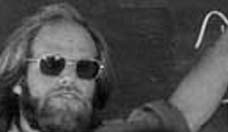 | American Taboo: A Peace Corps Tragedy
Returned Volunteers met with author Philip Weiss in Baltimore on June 18 to discuss the murder of Peace Corps Volunteer Deborah Gardner. Weiss was a member of a panel that included three psychiatrists and a criminal attorney. Meanwhile, the Seattle U.S. Attorney's office announced that Dennis Priven cannot be retried for the murder. "We do not believe this case can be prosecuted by anyone, not only us, but in any other jurisdiction in the United States." Read background on the case here. |
 | June 14: Peace Corps suspends Haiti program
After Uzbekistan, the Peace Corps has announced the suspension of a second program this month - this time in Haiti. Background: The suspension comes after a US Embassy warning, a request from Tom Lantos' office, and the program suspension last year. For the record: PCOL supports Peace Corps' decision to suspend the two programs and commends the agency for the efficient way PCVs were evacuated safely. Our only concern now is with the placement of evacuated PCVs and the support they receive after interrupted service. |
 | Friends of the Peace Corps 170,000 strong
170,000 is a very special number for the RPCV community - it's the number of Volunteers who have served in the Peace Corps since 1961. It's also a number that is very special to us because March is the first month since our founding in January, 2001 that our readership has exceeded 170,000. And while we know that not everyone who comes to this site is an RPCV, they are all "Friends of the Peace Corps." Thanks everybody for making PCOL your source of news for the Returned Volunteer community. |
Read the stories and leave your comments.

Some postings on Peace Corps Online are provided to the individual members of this group without permission of the copyright owner for the non-profit purposes of criticism, comment, education, scholarship, and research under the "Fair Use" provisions of U.S. Government copyright laws and they may not be distributed further without permission of the copyright owner. Peace Corps Online does not vouch for the accuracy of the content of the postings, which is the sole responsibility of the copyright holder.
Story Source: All Africa
This story has been posted in the following forums: : Headlines; Figures; Country Directors - Togo; Country Directors - Niger; AIDS; HIV
PCOL21306
61








